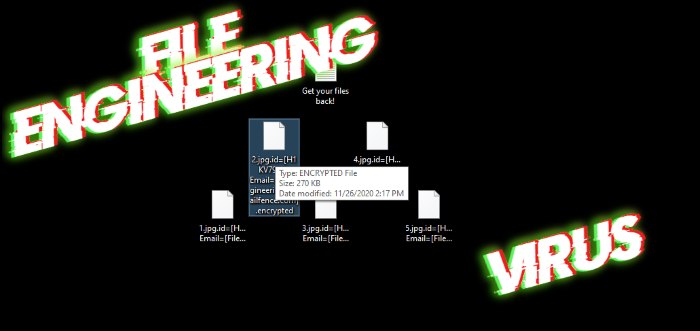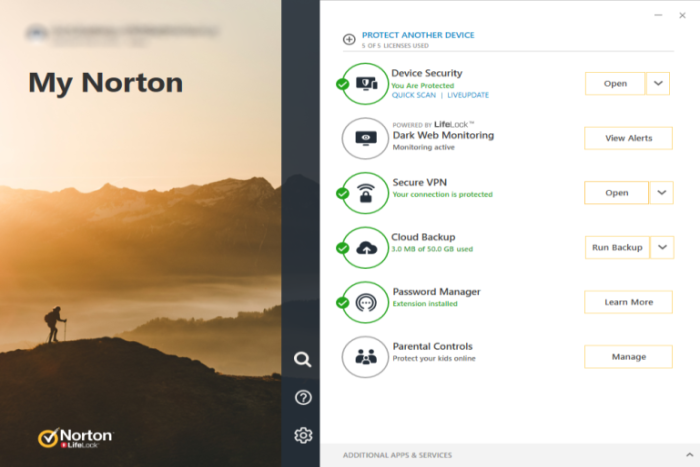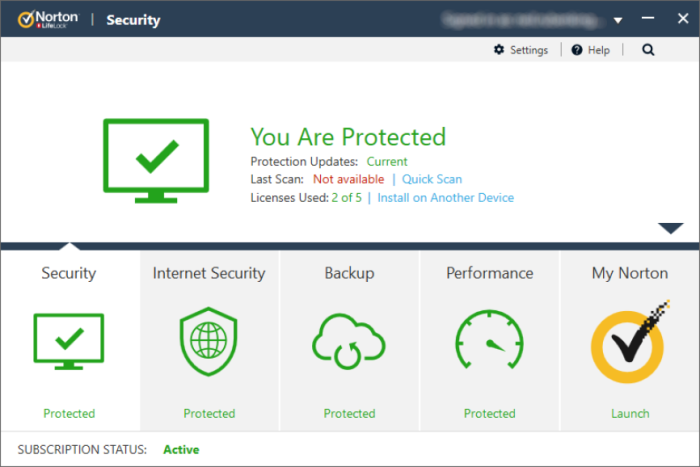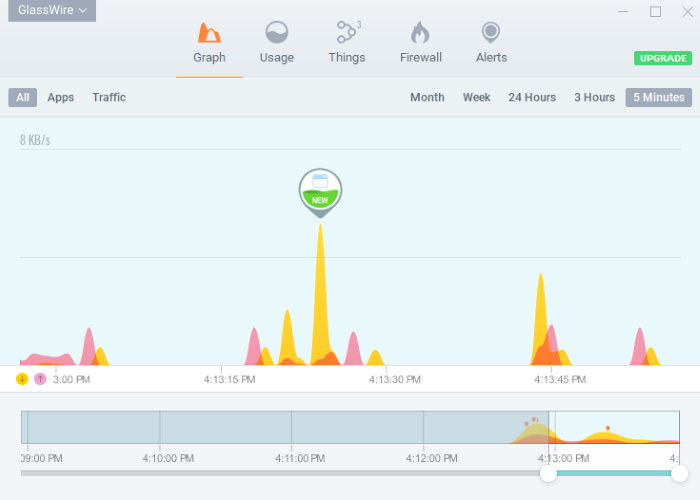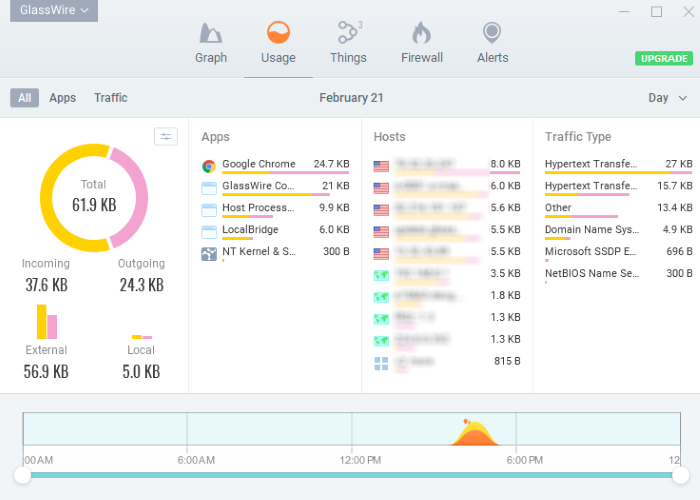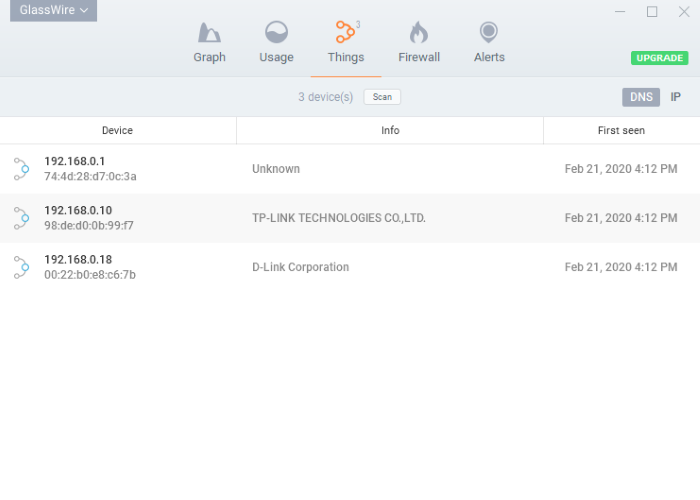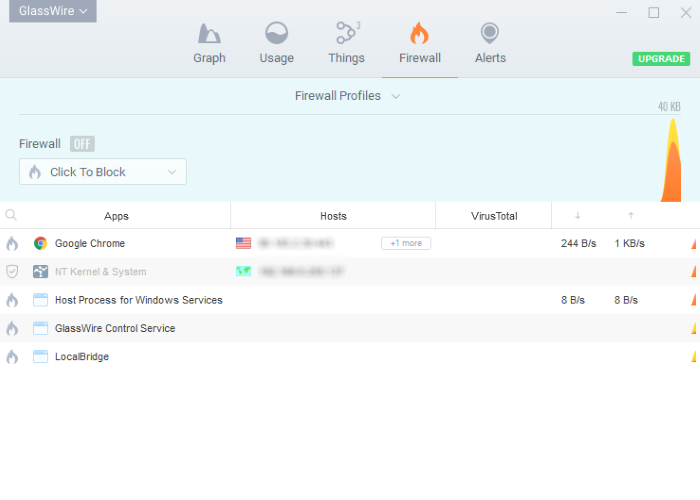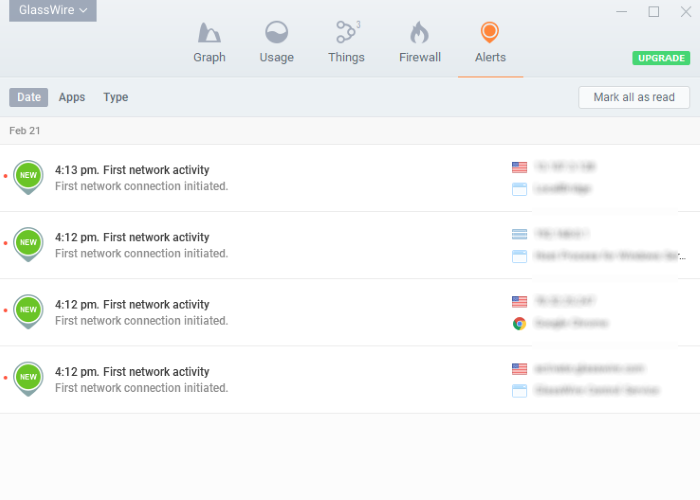What is FileEngineering?
Nowadays the activity of cyber criminals is very high. Every day malware hunters report about new threats and it’s very difficult to overlook all of them. In this article we are going to tell you about FileEngineering ransomware. This virus doesn’t belong to any already know file-encryption ransomware family. In the most cases, victims face FileEngineering ransomware because of the fake installers. Criminals promote them as if it’s free or even cracked software and share them by the means of free file sharing services and torrent trackers. Be aware, they also can infect your computer by the means of remote access terminals. When FileEngineering virus is in the system, it modifies the registry folder and infects system processes. As the result, your files get new “.id=[*ID*] Email=[FileEngineering@mailfence.com].encrypted” extensions. At the same time the virus drops the ransom note called “Get your files back!.txt”. By the means of thos note criminals try to assure victims, that the only way out is to write and pay them. We strongly recommend you to avoid any contact with them, because generally criminals often deceive the victims. That’s why it’s better to use the other way. Read our detailed guide on how to remove FileEngineering virus and decrypt “.encrypted” files without paying ransoms.
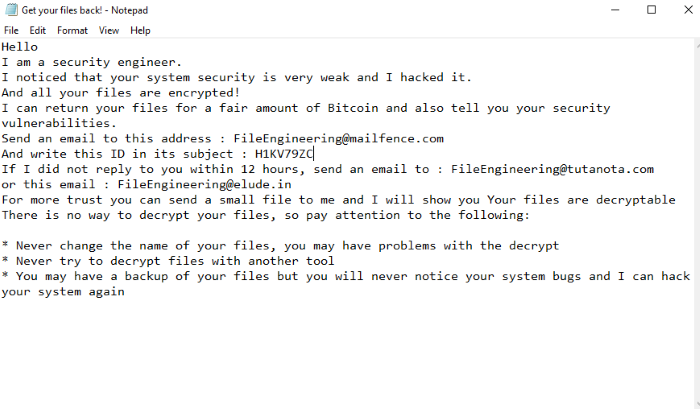
Get your files back!.txt
Hello
I am a security engineer.
I noticed that your system security is very weak and I hacked it.
And all your files are encrypted!
I can return your files for a fair amount of Bitcoin and also tell you your security vulnerabilities.
Send an email to this address : FileEngineering@mailfence.com
And write this ID in its subject : *ID*
If I did not reply to you within 12 hours, send an email to : FileEngineering@tutanota.com
or this email : FileEngineering@elude.in
For more trust you can send a small file to me and I will show you Your files are decryptable
There is no way to decrypt your files, so pay attention to the following:
* Never change the name of your files, you may have problems with the decrypt
* Never try to decrypt files with another tool
* You may have a backup of your files but you will never notice your system bugs and I can hack your system again
Article’s Guide
- How to remove FileEngineering ransomware from your computer
- Automatically remove FileEngineering ransomware
- Manually remove FileEngineering ransomware
- How to decrypt .encrypted files
- Automatically decrypt .encrypted files
- Manually decrypt .encrypted files
- How to prevent ransomware attacks
- Remove FileEngineering ransomware and decrypt .encrypted files with our help
How to remove FileEngineering ransomware from your computer?
Every day ransomware viruses change as well as their folders, executable files and the processes, which they use. For this reason it’s difficult to detect the virus yourself. That’s why we’ve prepared the detailed guide for you on how to remove FileEngineering ransomware from your computer!
Automatically remove FileEngineering ransomware
We strongly recommend you to use automated solution, as it can scan all the hard drive, ongoing processes and registry keys. It will mitigate the risks of the wrong installation and will definitely remove FileEngineering ransomware from your computer with all of its leftovers and register files. Moreover, it will protect your computer from future attacks.
Our choice is Norton 360 . Norton 360 scans your computer and detects various threats like FileEngineering virus, then removes it with all of the related malicious files, folders and malicious registry keys. Moreover, it has a great variety of other features, like protection from specific ransomware attacks, safe box for your passwords and many other things!

Manually remove FileEngineering ransomware
This way is not recommended, as it requires strong skills. We don’t bear any responsibility for your actions. We also warn you that you can damage your operating system or data. However, it can be a suitable solution for you.
- Open the “Task Manager”
- Right click on the “Name” column, add the “Command line”
- Find a strange process, the folder of which probably is not suitable for it
- Go To the process folder and remove all files
- Go to the Registry and remove all keys related to the process
- Go to the AppData folder and remove all strange folders, that you can find
How to decrypt .id=[*ID*] Email=[FileEngineering@mailfence.com].encrypted files?
Once you’ve removed the virus, you are probably thinking how to decrypt “.id=[*ID*] Email=[FileEngineering@mailfence.com].encrypted” files or at least restore them. Let’s take a look at possible ways of decrypting your data.
Restore .encrypted files with Stellar Data Recovery
If you decided to recover your files, we strongly advise you to use only high-quality software, otherwise your data can be corrupted. Our choice is Stellar Data Recovery. This software has proven to be very appreciated by customers, who have faced ransomware problems!

- Download and install Stellar Data Recovery
- Select drives and folders with your files, then click Scan.
- Choose all the files in a folder, then press on Restore button.
- Manage export location.
The download is an evaluation version for recovering files. To unlock all features and tools, purchase is required ($49.99-299). By clicking the button you agree to EULA and Privacy Policy. Downloading will start automatically.
Other solutions
The services we’ve mentioned in this part also guarantee users, that the encrypted data is unlikely to become damaged. But you should understand, that there is still a risk to corrupt your files.
”Decrypt”Decrypt
”Decrypt
Decrypt .id=[*ID*] Email=[FileEngineering@mailfence.com].encrypted files manually
If above mentioned solutions didn’t help to decrypt .id=[*ID*] Email=[FileEngineering@mailfence.com].encrypted files, still, there is no need to invest in the malicious scheme by paying a ransom. You are able to recover files manually.
You can try to use one of these methods in order to restore your encrypted data manually.
- Open My Computer and search for the folders you want to restore;
- Right-click on the folder and choose Restore previous versions option;
- The option will show you the list of all the previous copies of the folder;
- Select restore date and the option you need: Open, Copy and Restore.
”Restore
- Type restore in the Search tool;
- Click on the result;
- Choose restore point before the infection infiltration;
- Follow the on-screen instructions.
How to prevent ransomware attacks?
If you have successfully removed FileEngineering ransomware, you know probably think about the ways how to protect your data from future attacks. The best way is to create backups of your data. We recommend you to use only high-quality products. Our choice here is Stellar Data Recovery. This soft can easily create highly-qualified backups, has a user friendly interface and moreover, it can help you to restore your files! Then you should take under strict control all your internet connections. Some of the ransomware viruses connect to various internet services and can even infect computers that are connected to the same local network. That’s why it’s important to use a strong firewall, that can easily restrict any connection. The best choice is GlassWire. This program has a user friendly interface and it becomes very easy to prevent any ransomware or hacker attack.

To unlock all features and tools, purchase is required ($49.99-$299). By clicking the button you agree to EULA and Privacy Policy.
If you want to learn out more details about the ways how to prevent ransomware attacks, read our detailed article!
Write us an email
If your case is an unusual one, feel free to write us an email. Fill the form below and wait for our response! We will answer you as soon as possible. The files we need to inspect your case are: executable files of the virus, if it’s possible; examples of the encrypted files; screenshots of your task manager; ransom note; background screen.
CONCLUSION: nowadays, these solutions are the all possible ways to remove FileEngineering ransomware and decrypt “.id=[*ID*] Email=[FileEngineering@mailfence.com].encrypted” files. Nowadays the best way to remove it is the Norton 360 . Their specialists improve the scan system and update the databases every day. It helps not only to remove existing problems, but also protects computers from future attacks. If there is a new way to decrypt your files, we will update the article, so stay tuned.


